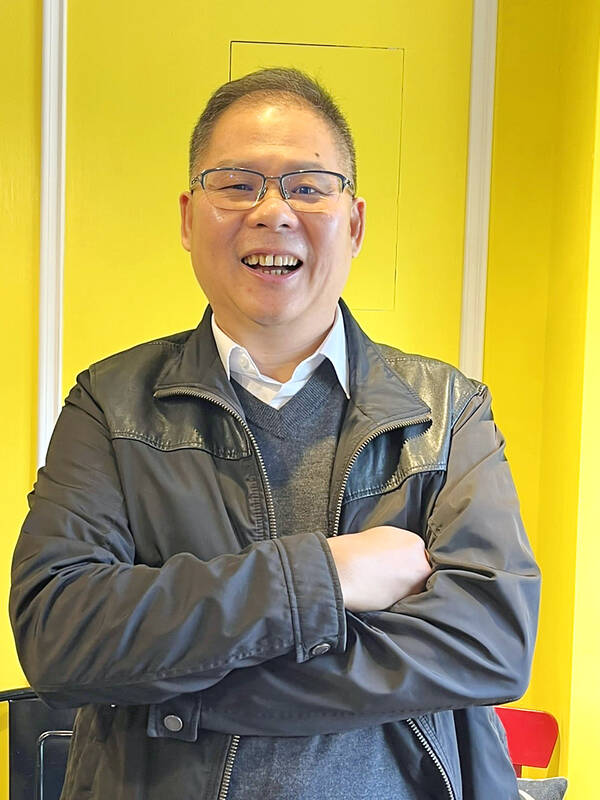Forward Science Corp (鋒魁科技) expects to achieve high double-digit percentage growth in revenue this year, the maker of vacuum pumps used in semiconductor and display manufacturing said yesterday, citing signs of recovery in the semiconductor industry.
The company is also upbeat about its business in the South Korean market, as it expects to ship the first batch of vacuum pumps to customers in the second half of this year, it said.
Samsung Electronics Co, LG Electronics Inc and SK Hynix Inc among potential customers, it added

Photo: Grace Hung, Taipei Times
In South Korea, the company operates a joint venture with Dongbang Plantech Co to deepen its local presence as Seoul joins
Tokyo and Washington in strengthening domestic semiconductor supply chains.
Headquartered in Miaoli County’s Jhunan Township (竹南), the company has an order backlog of 400 vacuum pumps for delivery this year, more than double the 150 units shipped last year, it said.
Vacuum pumps play an important role in semiconductor production as they help remove air and gas molecules from a sealed chamber and keep the environment clean.
Chipmakers tend to install more than 5,000 vacuum bumps to operate an advanced 12-inch fab using 3-nanometer technology, said Forward Science, which is 20 percent owned by semiconductor equipment supplier Marketech International Corp (帆宣系統科技).
“We are bullish about this year’s business outlook,” Forward Science chairman Jacky Chang (張育銓) told a media briefing in Hsinchu. “As the semiconductor industry is recovering gradually, the company is seeing an increase in orders from Taiwanese customers.”
As a result, the company is building a new factory in Miaoli County’s Sanwan Township (三灣).
Taiwanese customers accounted for about 90 percent of the company’s revenue last year, with Taiwan Semiconductor Manufacturing Co (台積電) its largest customer.
However, more new orders are coming from Chinese customers who are sourcing semiconductor equipment from non-US suppliers to achieve self-sufficiency, Chang said.
China is to contribute about 20 percent to the company’s revenue this year, he said.
The company’s revenue in the first 11 months of last year grew 23 percent to NT$270.86 million (US$8.73 million) from a year earlier, with 50 percent coming from vacuum pump sales and 35 percent from pump maintenance services.

POWERING UP: PSUs for AI servers made up about 50% of Delta’s total server PSU revenue during the first three quarters of last year, the company said Power supply and electronic components maker Delta Electronics Inc (台達電) reported record-high revenue of NT$161.61 billion (US$5.11 billion) for last quarter and said it remains positive about this quarter. Last quarter’s figure was up 7.6 percent from the previous quarter and 41.51 percent higher than a year earlier, and largely in line with Yuanta Securities Investment Consulting Co’s (元大投顧) forecast of NT$160 billion. Delta’s annual revenue last year rose 31.76 percent year-on-year to NT$554.89 billion, also a record high for the company. Its strong performance reflected continued demand for high-performance power solutions and advanced liquid-cooling products used in artificial intelligence (AI) data centers,

SIZE MATTERS: TSMC started phasing out 8-inch wafer production last year, while Samsung is more aggressively retiring 8-inch capacity, TrendForce said Chipmakers are expected to raise prices of 8-inch wafers by up to 20 percent this year on concern over supply constraints as major contract chipmakers Taiwan Semiconductor Manufacturing Co (TSMC, 台積電) and Samsung Electronics Co gradually retire less advanced wafer capacity, TrendForce Corp (集邦科技) said yesterday. It is the first significant across-the-board price hike since a global semiconductor correction in 2023, the Taipei-based market researcher said in a report. Global 8-inch wafer capacity slid 0.3 percent year-on-year last year, although 8-inch wafer prices still hovered at relatively stable levels throughout the year, TrendForce said. The downward trend is expected to continue this year,

Vincent Wei led fellow Singaporean farmers around an empty Malaysian plot, laying out plans for a greenhouse and rows of leafy vegetables. What he pitched was not just space for crops, but a lifeline for growers struggling to make ends meet in a city-state with high prices and little vacant land. The future agriculture hub is part of a joint special economic zone launched last year by the two neighbors, expected to cost US$123 million and produce 10,000 tonnes of fresh produce annually. It is attracting Singaporean farmers with promises of cheaper land, labor and energy just over the border.

A proposed billionaires’ tax in California has ignited a political uproar in Silicon Valley, with tech titans threatening to leave the state while California Governor Gavin Newsom of the Democratic Party maneuvers to defeat a levy that he fears would lead to an exodus of wealth. A technology mecca, California has more billionaires than any other US state — a few hundred, by some estimates. About half its personal income tax revenue, a financial backbone in the nearly US$350 billion budget, comes from the top 1 percent of earners. A large healthcare union is attempting to place a proposal before